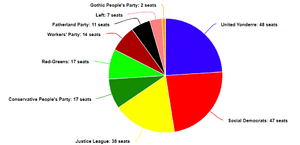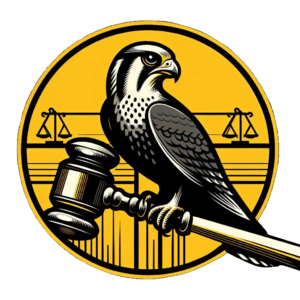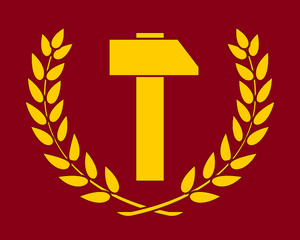Politics of Yonderre: Difference between revisions
Tag: 2017 source edit |
Tag: 2017 source edit |
||
| Line 30: | Line 30: | ||
[[File:National_Bolshevik_Party_flag.svg|thumb|Logo of the Fatherland Party]] | [[File:National_Bolshevik_Party_flag.svg|thumb|Logo of the Fatherland Party]] | ||
{{main|Fatherland Party (Yonderre)}} | {{main|Fatherland Party (Yonderre)}} | ||
The | The Fatherland Party is a {{wp|Syncretic politics|syncretic}} political party in [[Yonderre]] combining far-leftist economic policies with far-right social values. It is the third smallesst party represented in the [[Yonderian Parliament]], holding 11 of the 199 seats. Due to its syncretic nature, the Fatherland Party is generally considered to exist outside traditional bloc politics, instead being labeled as far leftist or far right on a case-by-case basis. The Fatherland Party describes the protection of [[Northern Ideal|Yonderian culture and sense of self]] as its central core tenet. | ||
The Fatherland Party was formed in 1950 from defectors chiefly from the [[Gothic People's Party]] and [[Workers' Party (Yonderre)|Workers' Party]] on a basis of ideas that included the nationalization of large companies and other assets vital for national interests, a self-sufficient planned economy, a parliament controlled by trade unions and the appointment of technocrats as ministers. With the entry of [[Yonderre]] into the [[Levantine Union]], the Fatherland Party adopted an LU-skeptic stance that helped boost its popularity. More or less direct {{wp|guild socialism}} has also at times been a major focus of the Fatherland Party. The Fatherland Party was first represented in the [[Yonderian Parliament]] in 1955 with three seats, and at its peak had 19 seats in 1981. | The Fatherland Party was formed in 1950 from defectors chiefly from the [[Gothic People's Party]] and [[Workers' Party (Yonderre)|Workers' Party]] on a basis of ideas that included the nationalization of large companies and other assets vital for national interests, a self-sufficient planned economy, a parliament controlled by trade unions and the appointment of technocrats as ministers. With the entry of [[Yonderre]] into the [[Levantine Union]], the Fatherland Party adopted an LU-skeptic stance that helped boost its popularity. More or less direct {{wp|guild socialism}} has also at times been a major focus of the Fatherland Party. The Fatherland Party was first represented in the [[Yonderian Parliament]] in 1955 with three seats, and at its peak had 19 seats in 1981. | ||
The Fatherland Party has been described variously at times as national socialist, national communist, anti-immigration, radical conservative and anti-progressive. The party opposes feminism, LGBT rights and societal permissiveness, favouring instead traditional gender roles and the nuclear family. | The Fatherland Party has been described variously at times as national socialist, national communist, anti-immigration, radical conservative and anti-progressive. The party opposes feminism, LGBT rights and societal permissiveness, favouring instead traditional gender roles and the nuclear family. | ||
===Gothic People's Party=== | ===Gothic People's Party=== | ||
Revision as of 05:26, 5 August 2024
This article is a work-in-progress because it is incomplete and pending further input from an author. Note: The contents of this article are not considered canonical and may be inaccurate. Please comment on this article's talk page to share your input, comments and questions. |

The politics of Yonderre take place within the framework of a parliamentary representative democracy, a constitutional monarchy and a decentralised unitary state in which the Grand Duke of Yonderre is the head of state. Yonderian politics and governance are characterized by a common striving for broad consensus on important issues, within both the political community and society as a whole. Yonderre has a multi-party system, with two large parties (the Social Democratic Party and United Yonderre) and several other small but significant parties. No single party has held an absolute majority in the Parliament since 1901 when the Conservative People's Party held 101 of the 199 seats. Nine parties are currently represented in the Yonderian Parliament.
On many issues the political parties tend to opt for co-operation, and the Yonderian state welfare model receives broad parliamentary support. This ensures a focus on public-sector efficiency and devolved responsibilities of local government on regional and municipal levels. Executive power is exercised by the government, presided over by the Steward of the Realm who is first among equals. Executive power is also wielded by the Grand Duke of Yonderre but only rarely exercised. Legislative power is exercised by the Yonderian Parliament. Members of the judiciary are nominated by the executive (conventionally by recommendation of the judiciary itself), formally appointed by the Grand Duke and employed until retirement.
Parties represented in parliament

Nine parties are currently represented in the Yonderian Parliament:
Government (101)
- United Yonderre (48)
- Justice League (36)
- Conservative People's Party (17)
Opposition (98)
- Social Democrats (47)
- Red-Greens (17)
- Workers' Party (14)
- Fatherland Party (11)
- Left (7)
- Gothic People's Party (2)
Sorted alphabetically, the following is an overview of the parties currently represented in the Yonderian Parliament:
Conservative People's Party
The Conservative People's Party is a conservative political party in Yonderre.
Fatherland Party
The Fatherland Party is a syncretic political party in Yonderre combining far-leftist economic policies with far-right social values. It is the third smallesst party represented in the Yonderian Parliament, holding 11 of the 199 seats. Due to its syncretic nature, the Fatherland Party is generally considered to exist outside traditional bloc politics, instead being labeled as far leftist or far right on a case-by-case basis. The Fatherland Party describes the protection of Yonderian culture and sense of self as its central core tenet.
The Fatherland Party was formed in 1950 from defectors chiefly from the Gothic People's Party and Workers' Party on a basis of ideas that included the nationalization of large companies and other assets vital for national interests, a self-sufficient planned economy, a parliament controlled by trade unions and the appointment of technocrats as ministers. With the entry of Yonderre into the Levantine Union, the Fatherland Party adopted an LU-skeptic stance that helped boost its popularity. More or less direct guild socialism has also at times been a major focus of the Fatherland Party. The Fatherland Party was first represented in the Yonderian Parliament in 1955 with three seats, and at its peak had 19 seats in 1981.
The Fatherland Party has been described variously at times as national socialist, national communist, anti-immigration, radical conservative and anti-progressive. The party opposes feminism, LGBT rights and societal permissiveness, favouring instead traditional gender roles and the nuclear family.
Gothic People's Party
The Gothic People's Party is an ethnonationalist political party in Yonderre with far-right policies.
Justice League

The Justice League is a national-conservative libertarian political party in Yonderre. It is the third largest party in the Yonderian Parliament, holding 36 of the 199 seats. The Justice League has held the Stewardship of Yonderre multiple times, first in 1951-55 and most recently 1988-1993 when Phillipe de Bordelleaux led a coalition government with United Yonderre and the Conservative People's Party.
The Justice League defines itself as "non-socialist", combining classically conservative value-based policies with liberal economic policies. The party runs for parliament on a platform of a strong cultural community of values, a diminished state, common responsibility for the weakest in society, reasonable protection of natural values and freedom, democracy, and national sovereignty. The party is skeptic of non-Levantine immigration and of Levantine Union overreach of Yonderian sovereignty.
The Justice League has often formed coalition goverments with fellow centre-right parties United Yonderre and the Conservative People's Party. The party has been described variously as national conservative, national liberal, right-wing populist, nationalist, minarchist and anti-immigration.
Left
Left is a leftist social liberal political party in Yonderre.
Red-Greens
The Red-Greens is an eco-socialist anti-capitalist communist political party in Yonderre.
Social Democratic Party
The Social Democratic Party, known in common parlance as the Social Democrats, is a social democratic centre-left political party in Yonderre.
United Yonderre

United Yonderre is a conservative-liberal centre-right political party in Yonderre. Founded in 1905 by the merger of the Christian Democratic Party and National Liberal Party, United Yonderre is the dominant party of the political right in Yonderre and the largest party in the country by votership, second-largest by membership behind the Social Democrats. The party has produced numerous Stewards of the Realm including the incumbent Hercule d'Arcaneaux.
The party achieved rapid growth during the 1900s and 1910s in the face of the Great Depression, largely thanks to the growing urbanization and the failed economic policies of the Social Democrats. United Yonderre became the third largest party in the Yonderian Parliament in 1918 behind the Social Democrats and Conservative People's Party. The party first held the office of Steward of the Realm in 1936 when Alexandre d'Ecaux replaced the Social Democrat Adolphe Heineau. United Yonderre remained a top party in Yonderian politics throughout the Occidental Cold War, maintaining a rivalry with the Social Democrats over the Stewardship of Yonderre which persists to this day.
United Yonderre is categorised as centre-right on the political spectrum, although it has been also described as centrist and right-wing. Ideologically, it has been described as conservative-liberal, liberal-conservative, liberal, conservative, classical-liberal, and agrarian. United Yonderre states its economic goals as "improving the competitiveness of the economy through access to innovative development, support of science, infrastructure development, increasing investment primarily in high technology, the industry - the engines of economic growth". The party is pro-welfare state funded by taxation "in support of civil society, to promote social mobility and activity". United Yonderre finds much common ground politically with the Conservative People's Party and Justice League, both of which it has often formed coalition governments with.
Workers' Party

The Workers' Party is a communist political party in Yonderre. The party was founded in 1918 by members from the Social Democrats, breaking away to pursue a more hardline form of socialism. Formed chiefly by steel workers in Toubourg, the party grew steadily in popularity, being first represented in Yonderian Parliament in 1928. The party grew in strength throughout the Second Great War years until peaking in the 1960s. Unpopular leadership and radical changes to party line led to a steady decline in popularity through the 1970s and 80s until a faction broke off and formed the Red-Greens in 1985, taking with them more than a third of the WP's members.
The Workers' Party bases their politics around Stahlism, from the Gothic Stahl meaning "steel". It runs for the Yonderian Parliament on promises of equality, wide-scale nationalisation of businesses and services and the building of communist society with the state as the only tool. It describes socialism as "an answer to the problems caused by capitalism such as non-sufficient democracy, crises, destruction of nature, inequality, racism and war". Initially preaching violent revolution and the abolishment of the Grand Duke and the Catholic Church all together, the party has gradually sought a softer line as this position became mostly untenable in Yonderian politics. Although its electoral support has declined in recent decades, the WP retains an influence in Yonderian politics, especially at the local level.
See also